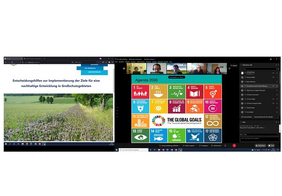On 29 October, 35 participants from large protected areas discussed the challenges of implementing the global Sustainable Development Goals (SDGs) in national parks, UNESCO biosphere reserves, nature parks and UNESCO geoparks in a two-hour online workshop.
Information materials and practical examples from the SDG.imp project were presented at the national final workshop. In a mentimeter survey, the participants confirmed that the materials are equally suitable as a source of information, a repository of ideas and almost as often as presentation materials for workshops and can be highly relevant for practice.
A practical input from the Berchtesgaden National Park made it clear how important the role of the large protected area administration is in order to lead the way for sustainable development and thus to credibly involve regional actors. A practical input from the Pfälzerwald biosphere reserve showed on the one hand the great importance of local authorities for the sustainable development of large protected areas, which was also confirmed again in the later discussion, and on the other hand how differently local authorities and citizens can develop sustainability strategies. A final practical input from the Bergstrasse-Odenwald Geo-Nature Park underlined the central role of Education for Sustainable Development for sustainable development and the cooperation and networking of different stakeholder groups in large protected areas.
The subsequent discussion with the participants made it clear that the central challenges in implementing the SDGs lie on the one hand in the complex subject matter and the partly low level of knowledge or lack of awareness, and on the other hand that different interests and conflicting goals between regional stakeholder groups make joint action difficult. Large protected area administrations in their role as network managers for sustainable development were seen as predestined to tackle these challenges, although they are limited in this function by a lack of staff and limited time capacities.
The workshop took place within the framework of the Erasmus+ project SDG.imp and was jointly organised and conducted by the Biosphärenzweckverband Bliesgau and the IfLS.
Contact persons at IfLS: Christoph Mathias (mathias[at]ifls.de), Dr. Ulrich Gehrlein (gehrlein[at]ifls.de)
